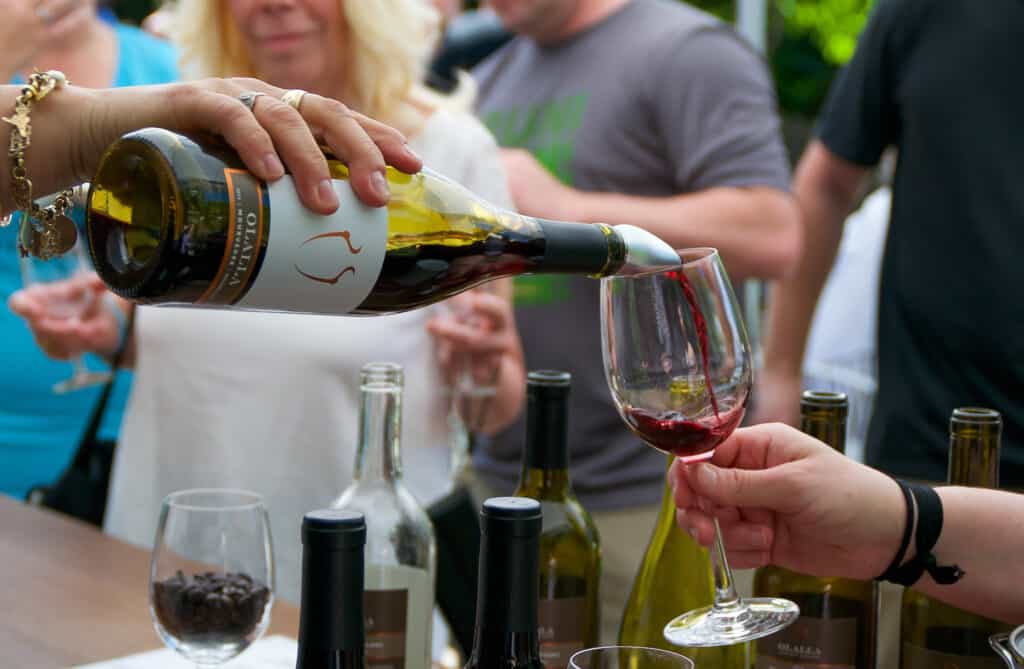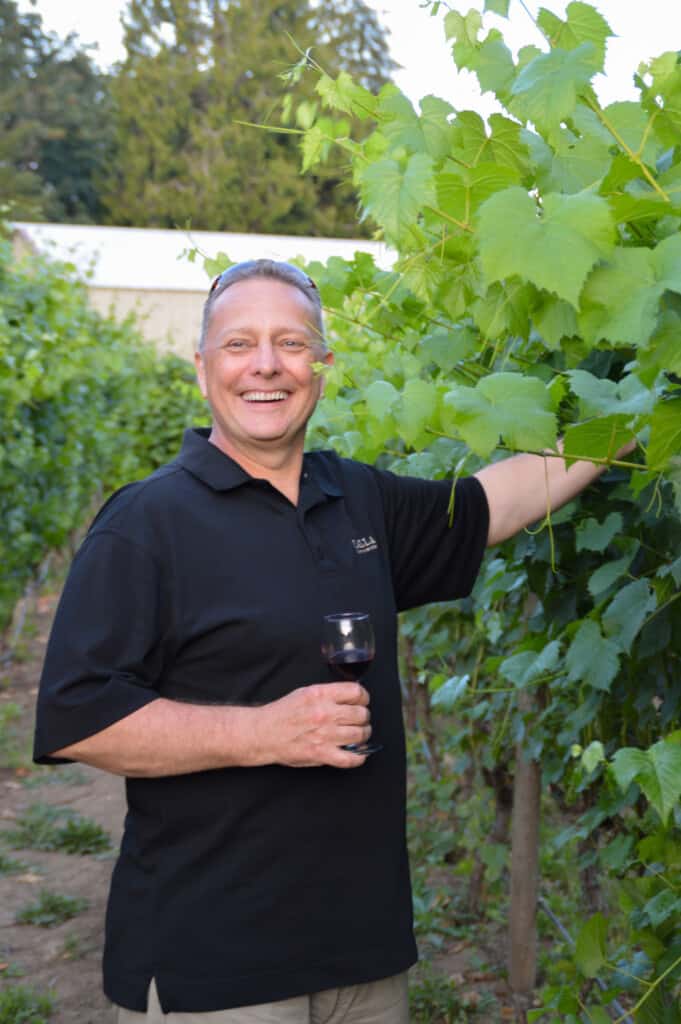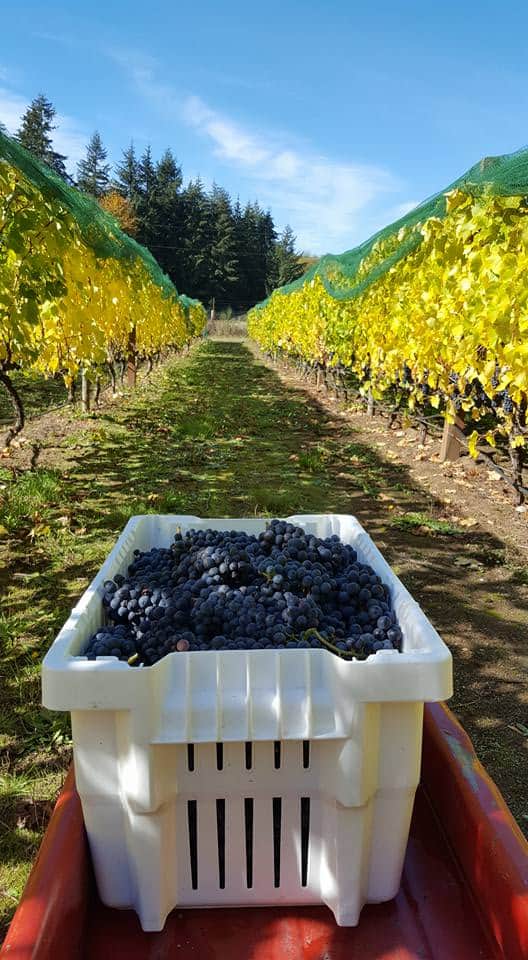Arts & Entertainment Business Government
Olalla winery in jeopardy of losing permit for special events
No decision was reached after a 10-hour Kitsap County hearing Thursday on the status of Olalla Valley Vineyard and Winery‘s conditional use permit (CUP).
The 5.87-acre winery, owned and operated by Stuart Chisholm and Mary Ellen Houston, is zoned Rural Protection (RP), which permits agriculture-related uses and agritourism. The permit was issued in April 2017, subject to conditions on events and the operation of a tasting room for wine produced at the site.

Pouring wine at Olalla Valley Vineyard and Winery. Photo courtesy of Olalla Valley Vineyard and Winery
The permit expands the list of things allowed in RP zones, including 16 outdoor events from June thru September with attendance of up to 100 that comply with the county’s noise ordinances. Tasting room activities can take place from May through October, Thursday through Saturday from noon until 8 p.m., Sunday from 1 p.m. to 5 p.m. and by appointment from November through April.
According to the permit revocation report filed by Department of Community Development (DCD) staff, the winery “routinely exceeded the number of outdoor events permitted and the number of guests allowed on the property for events granted under their CUP approval.”
In addition, the report stated that the winery held an outdoor event in May 2021, has not limited wine tastings to appointment only during the fall and winter, and has established a wine and beer bar that was not approved. Also, it has allowed cars to be parked outside the approved area and RVs to stay overnight, which is not permitted. DCD provided photos of RVs parked on winery grounds and aerial photos of lines in a field that staff claims were tire marks made by cars parked illegally.
All this has led to “a multitude of complaints” from two neighbors, as well as increased traffic and noise, the report stated.
DCD staff presented charts listing the dates and descriptions of outdoor music events and the number of people attending music events, and referred to statements on the winery’s and bands’ websites as proof of violations.
Staff explained the difference between a tasting room and a wine bar. In a tasting room, products are not served in containers greater than 4 ounces. At a wine bar, by-the-glass or bottle servings can be offered. “In the CUP and its supporting documents, DCD did not analyze a wine bar, but it is understood that today wine by the glass is being sold in the tasting room,” staff wrote.
The report also listed several letters county staff sent to the winery, expressing concern about the neighbors’ complaints. It notes that the winery responded to many but not all of the letters, disputing many of the allegations.
Specifically, DCD staff lists 13 alleged violations of the winery’s permit: number of events exceeding allowed amount; number of persons exceeding allowed amount; number of parked cars exceeding allowed amount; approved parking plan not being followed; noise ordinance being violated during events; amplified sounds going past the cut-off of 9 p.m.; site plan changes and membrane structures without permits; events starting outdoors before the month of June; lack of port-a-potties and instead using a small bathroom; trespassing by patrons onto or through others’ properties; no-trespassing signs being removed/destroyed; unauthorized outdoor events; hosting of RVs overnight; a bar or tavern being established; the appointment-only requirement being abandoned.
The staff report recommending revocation of the winery’s permit was signed by David Lynam, manager of building and fire safety, and Scott Diener, manager of development services and engineering.
The winery’s response
Alan Wallace, Olalla Valley Vineyard and Winery attorney, presented several witnesses who disputed the county’s findings and questioned its procedures.
Under Wallace’s questioning, Diener acknowledged that although the winery had invited county staff to attend several events, none had ever done so. “It can be hard to get staff to work on weekends in the summer,” he said, adding that staff had suggested to winery owners that they amend the permit to increase the number of events allowed.
Wallace suggested that the marks identified in photographs as tire treads could have been made by farm equipment such as mowers. Chisholm confirmed that he mowed the area regularly and that once a year a gravel truck drives across the field when making a delivery.
Lynam said that his department had “verified the winery’s website for specific events and that social media posts also noted other events such as weddings that aren’t listed on the website.” He added that there are fines for violations of CUPs, with $250 for the first infraction.
“We’ve issued citations in the past for $250 (to other businesses), but it just becomes a cost of doing business” for most businesses. “I think the crux of this is, has the winery exceeded the allowed number of events,” he said.
Winery witness William Palmer is a project representative and consultant who helps clients, including the winery, “get through the permitting process.” He said there is no formal, written notice, no mention in the county’s report of the threshold for how many events are allowed. “In my experience, it’s customary for a county to notify a conditional use permit holder of what the problem is and how to fix it,” he said.
Palmer also questioned how the county has measured noise from the winery to determine if it’s coming from events or from the staff playing a stereo loudly.
Another winery witness, Christine Civiletti, is the code enforcement officer for San Mateo, Calif. She pointed out that the Kitsap County code says that “a CUP may be revoked, not shall be revoked,” and that under industry standards, it’s not normal to send a revocation notice as Step 1 in response to a complaint.
She also noted that the county has not clearly stated the rules regarding issues such as amplification. “And to say that the county doesn’t have the staff to observe events, well, that’s their responsibility to verify complaints and to personally document them.
“In my department, emails don’t count as an official notice under industry standards,” she said. “And per Kitsap County RCW 7.80.050, a code enforcement officer must personally observe a violation,” including doing a head count at events, “because that’s one of their duties regarding public safety.”
Civiletti noted a number of other inconsistencies between county code and how the DCD has handled the situation.
In the end, everyone agreed to continue the hearings on Jan. 21 at which time both sides will present their final arguments.



